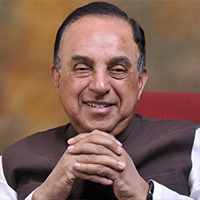Subramanian Swamy
Subramanian Swamy is an Indian politician, economist and statistician, who serves as a nominated Member of Parliament in Rajya Sabha, the upper house of the Indian Parliament. Before joining politics, he was a professor of Mathematical Economics at the Indian Institute of Technology, Delhi.
Subramanian Swamy ,efore joining politics, he was a professor of Mathematical Economics at the Indian Institute of Technology, Delhi.[1] He is known for his Hindu nationalist views.[2] Swamy was a member of the Planning Commission of India and was a Cabinet Minister in the Chandra Shekhar government. Between 1994 and 1996, Swamy was Chairman of the Commission on Labour Standards and International Trade under former Prime Minister P. V. Narasimha Rao. Swamy was a long-time member of the Janata Party, serving as its president until 2013 when he joined the Bharatiya Janata Party (BJP).[3]
He has written on foreign affairs of India dealing largely with China, Pakistan and Israel. He was nominated to Rajya Sabha on 26 April 2016.
Subramanian Swamy was born in Mylapore, Chennai, Tamil Nadu, India, to a family which hailed originally from Madurai in Tamil Nadu.[4][5] He identifies as a Brahmin.[6] His father, Sitaraman Subramanian, was a bureaucrat and his mother, Padmavathi, was a homemaker. Sitaraman Subramanian was an officer in the Indian Statistical Service who served as the director of the Central Statistical Institute in Delhi, and was a statistical adviser to the Government of India.[8] The family, which hailed from Madurai in Tamil Nadu, moved to New Delhi when Swamy was only six months old. Due to his father’s job and the family’s Tamil roots, major national leaders like K. Kamaraj, C. Rajagopalachari and S. Satyamurti often visited Sitaraman.
Swamy attended Hindu College, University of Delhi, from where he earned his bachelor’s degree in Mathematics. He then took his master’s degree in Statistics from the Indian Statistical Institute, Kolkata. He was later recommended by Hendrik S. Houthakker[10] and went to study at Harvard University on a full Rockefeller scholarship,[10] where he received his PhD in Economics in 1965, with his thesis titled Economic Growth and Income Distribution in a Developing Nation.[12] His thesis adviser was Nobel laureate Simon Kuznets.[10][13] While he was a doctoral student at Harvard, he attended Massachusetts Institute of Technology as a cross-registered student[14] and later worked at the United Nations Secretariat in New York City as an Assistant Economics Affairs Officer in 1963. He subsequently worked as a resident tutor at Lowell House at Harvard University.
In July 1965, immediately after obtaining his PhD in economics from Harvard, Swamy joined the Department of Economics at the Harvard Faculty of Arts and Sciences as an assistant professor.[10][1] in 1969, he was made an associate professor..Thereafter, Swamy moved to the Indian Institute of Technology, Delhi where he was a full Professor of Mathematical Economics there from 1969 to the early 1970s.[1][19] He was removed from the position by its board of governors in the early 1970s but was legally reinstated in the late 1990s by the Supreme Court of India. He continued in the position until 1991 when he resigned to become a cabinet minister. He served on the Board of Governors of the IIT, Delhi (1977–80) and on the Council of IITs (1980–82). He also taught economics courses at Harvard Summer School[20] until 2011, when the Harvard faculty voted to eliminate Swamy’s courses as a result of his “offensive” statements about Muslims. Swamy’s career started with his involvement in the Sarvodaya movement, which was an apolitical movement but which formed the foundation of the creation of Janata Party later.[26] The real turn in his political career came after his sacking from IIT. Liberal economic policies put forward by him did not go well with the then Prime Minister Indira Gandhi who sneered at his plans as ‘Santa Claus with unrealistic ideas’. He was later expelled from the Indian Institute of Technology Delhi. This marked the beginning of his active political career. Staunch opponent of Indira Gandhi Bharatiya Jana Sangh sent him to Rajya Sabha – the upper house of Indian Parliament.[8]
He was an elected Member of Parliament five times between 1974 and 1999. As a Lok Sabha candidate, he has represented the city of Mumbai North East twice (1977 and 1980) and the city of Madurai (1998). As a Rajya Sabha candidate, he has represented Uttar Pradesh (1974) in the Parliament.[8]
During the period of the Emergency, he fled to the United States, seeking haven with an Indian businessman in Michigan who had become the spokesperson of the opposition in the United States. in 1976, when the Emergency was still in force and an arrest warrant had been issued in his name, Swamy came to Parliament to attend the session and managed to escape India after the session was adjourned. This act of defiance was well received in the eyes of opposition parties.[27][28]
Swamy was a long-time member of the centre-right Janata Party until 2013 when he joined the Bharatiya Janata Party.
Petition to strike down anti-defamation laws Complaint against Jayalalithaa Phone tapping allegation Hashimpura massacre Role in exposing 2G spectrum case Sanction to prosecute telecom minister A. Raja Petition to strike down “single directive provision” Investigation on EVM National Herald case State control of Hindu temples Ayodhya temple case Campaign against black money

Subramanian Swamy
Date of Birth: 15 Sep 1939
Birth Place: Mylapore
Proffession: Member of Rajya Sabha
Nationality: Indian


